By David Hooker, Contributing Writer, Classical Wisdom Weekly
“Life is solitary, poor, nasty, brutish, and short.” So said the 17th Century English philosopher Thomas Hobbes in his magnum opus, Leviathan. It is a stark and negative statement, to be sure.
Of course, Hobbes had in mind that the life of ordinary people would go much better under both a strong Sovereign and governmental structure, but on its surface there is some serious truth in his statement.
Human life can be full of wonder, happiness, fulfillment, and love. However, often concurrent with these positives, we must all endure negatives such as terrible diseases, loss, loneliness, war, destruction, and ultimately death.
The ancient Athenian historian and general, Thucydides (ca. 472 – 400 BC), in his monumental work History of the Peloponnesian War (dates of the war: 431-404 BC) records one of the greatest speeches of the ages in Pericles’ “Funeral Oration.”
The situation addressed by Pericles is somewhat analogous to a Memorial Day celebration in the U.S., where the President speaks to honor the soldiers who lost their lives in war.
Pericles was making an address to Athenian citizens the year after the war with Sparta had begun, in which he recounts many of the glories and blessings of Athenian life during that time. He extols the virtues that the citizens enjoyed, such as freedom, democracy, the rule of law, an open society, patriotism, free trade, and consequent prosperity.
According to Pericles, Athens had reached such a height that it served as “the school of Hellas.” The prosperity and freedom of the Athenians, of course, was due to the honor and bravery of those who died defending Athens. “Freedom,” most certainly, was “not free.”
In one of the supreme ironies of recorded history, within a year after Pericles made his famous oration extolling the virtues and prosperity of Athens, the city was stricken by plague.
The death and destruction were horrific, and Thucydides gives a thorough record of their effects on the population.
He states that plague spread with “appalling rapidity,” causing widespread sickness of the most unpleasant kind and mass death. Lawlessness prevailed; people forgot their morals, religion, and ethics, and, in Thucydides words, “resolved to enjoy themselves while they could, and to think only of pleasure.”
Their physicians could make no headway against the spread of the plague, and their prophets and priests were unsuccessful in availing of divine help:
No human art was of any avail, and as to supplications in temples, inquiries
of oracles, and the like, they were utterly useless, and at last men were over-
powered by the calamity and gave them all up.
The Athenians realized in brutal fashion the truth of Hobbes’ aforementioned statement about life being “nasty and short,” having come from the height of their freedom and prosperity to dismal suffering from plague and war.
Of course, as most of our Classical Wisdom enthusiasts know, the war with Sparta ended up being a catastrophic loss for Athens in 404 BC, and the prosperous and free golden age of Pericles was long behind it.
Thucydides encapsulates in his work what amounts to an analogy for the human experience in general: the astonishing heights a great civilization can reach on the one hand, coupled with the miserable lows they can descend into on the other.
As I write this, we are nearing the end of another hurricane season in the northern part of the western hemisphere. In early September, Hurricane Dorian struck the Bahamas with such a fury that $7 Billion of damage was caused and, much worse, 61 people lost their lives and 70,000 were left homeless. It was catastrophic.
All of us read of natural calamities taking place each year, wherever we live. Ironically, it sometimes takes the worst of natural calamities for the best in human nature to come forward, manifested in unusual acts of bravery, charity, love, and care for those affected.
My point in using these two examples, from ancient Greece to the present, is to show that this is the natural cycle of human life – from the dreadful low points in human experience to the high points.
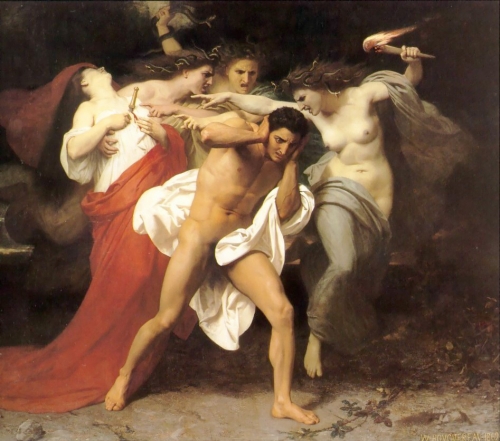
William-Adolphe Bouguereau. Orestes Pursued by the Furies, 1862. Chrysler Museum of Art, Norfolk, Virginia
Though all of us have suffered in some way in this life (or will), we manage to come through with amazing contributions to the overall human experience: amazing acts of kindness and charity, creation of great art works, literature, architecture, scientific achievements, relief of suffering through medical breakthroughs, and the like. Life goes on.
Has Classical Wisdom anything to say to us about how we should live our lives in response to life’s extreme vicissitudes? Moreover, how do we respond to life’s ultimate brevity?
As it turns out, these subjects weighed heavily on the minds of the ancient thinkers, and the study of ethics came about in ancient Greece to articulate an answer to the problem of “how we should live.”
Was it, “eat, drink, and be merry for tomorrow we die”? Or were there rationally attained virtues and guidelines for human beings to strive towards in order to overcome moral laxness, existential despair, and the overall feeling that we cannot make a difference on our own?
The study of ethics (normally defined today as a moral philosophy of personal and/or corporate behavior) was addressed somewhat by pre-Aristotelian philosophers and writers (such as Homer, Aesop, and Pythagoras), but it was up to the Macedonian philosopher Aristotle (ca. 384-322 BC) to leave us an entire life’s work dedicated to the subject.
According to Aristotle, our behavior and ethics had a telos; a “goal” or “purpose” higher than ourselves. In other words, how we behave and respond to life’s negatives matters.
He was writing at a time after the greater Greek world (“Hellas”) had gone through the convulsions of the Peloponnesian War and plague. In one of his most influential and popular works, the Nicomachean Ethics (likely named after his son Nicomachus), Aristotle set forth in a series of lectures several propositions, guidelines, and his famous “Golden Mean.”
The Golden Mean is where virtue lies, between the vices of excess and deficiency. Courage is a virtue, situated between the excess of rash confidence and the deficiency of cowardice; liberality is a virtue, situated between the excess of prodigality and the deficiency of miserliness. Aristotle thusly contrasts many other virtues and vices.
The Ethics is set forth in a series of ten “Books,” each subdivided into several chapters. These explicated to his students (count us in, Classical Wisdom Weekly fans!) how human beings can, by reason and practice, excel towards virtue and excellence (arête).
Ultimately, these practices can result in happiness (Eudaimonia) which then enables the achievement of the summum bonum (the “highest good,” or “goodness embodied in a flourishing human life”). He also addresses issues such as cultivation and improvement of friendships, and explains the nature of Eudaimonia.
This idea of the happiness of human beings, for Aristotle, carried with it a teleological element. Teleology is derived from the Greek word telos, meaning “goal” or “purpose.” For Aristotle, our behavior can be modified by teaching and diligent practice. Moreover, our acts have consequences; ideally in the furtherance of good intentions and aims.
This is the way we ought to live—a noble way of living. Far from being aimless, drifting, and purposeless in such a challenging world, humans can act with a purpose which uplifts not only themselves, but everyone around them.
As we master ourselves, our passions, and our personal behaviors, we cultivate these virtues and contribute to the summum bonum, or the “highest good” of human activity. This is real “happiness.”
Of course, for Aristotle, being the master thinker that he was, philosophy was the mechanism whereby this ultimate good could be realized. Each of us should aspire to be a student of philosophy in order to “know ourselves” much, much better.
Moreover, we should constantly examine our motives, set out goals for ourselves towards greater achievement, and make a habit of virtuous behaviors. In other words: Rise! We can do it!
In so doing, we improve our own lot in life while also improving our relationships with our families, friends, and communities. By being the best we can be as individuals, it is only natural that the community at large is uplifted and inspired as well.
Allow me to put something quite deep into more prosaic terms and examples: Are you a teacher? Then be the best possible teacher you can be. Are you an artist? Then be the best possible artist you can be. Are you in business? Then run the best and most ethical business you can. On and on. (A contemporary example of the latter is the rise recently of the doctrines of “conscious Capitalism”—a more holistic and ethical approach to the making of profit.)
The bottom line here is this: whatever you do, do it to the best of your ability and always strive to improve. By doing this we maximize our natural talents and potential and, as the saying goes, “make the world a better place.” Invest in yourself and others will prosper along with you. Making the best of ourselves, in an ethical fashion, helps lead all of us toward the summum bonum (greatest good).
Like most of you, from a very young age I’ve contemplated the very difficult existential question of life: does it have a purpose? The same for our Universe: does it have any purpose? Is there meaning?
We inhabit a Universe that simultaneously provides us with evidence of a well-ordered design (Aristotle, for example, thought nature followed some kind of order implemented by the “Unmoved Mover”) as well as randomness, chaos, and destruction.
How do we respond to all this? Do we “eat, drink, and be merry,” since tomorrow we die? Life is “nasty, brutish, and short” anyways, right? Or, do we take Aristotle’s cue and cultivate our virtues, abilities, and talents in order to best realize our happiness and make this a better world?
On this wager, I’ll take the latter proposition. I have nothing to lose from following the ethical path to realize my own potential and maximize my own personal virtues, thereby living a life devoted to Aristotle’s idea of excellence and happiness.
Is there something of us that continues after death—an afterlife, if you will? Or do we return to the void? Regardless, we are all in the same boat while we are alive. And when all is said and done, dear reader, what kind of life would you have wished you lived?
So take the rewarding proposition: take Aristotle’s cue and pursue virtue, excellence, and happiness. Read his Nicomachean Ethics—and continue on to other sources of classical wisdom. You’ll have a much more rewarding and full life, in good times and bad. What more meaning, what more purpose, could one ask for than that?

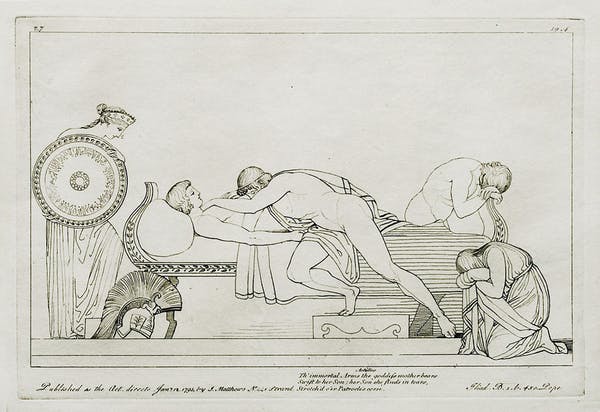
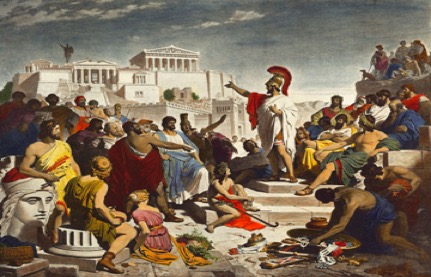
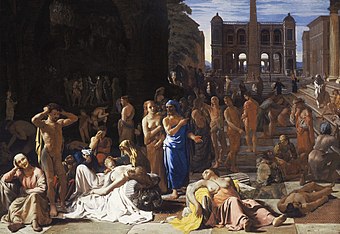
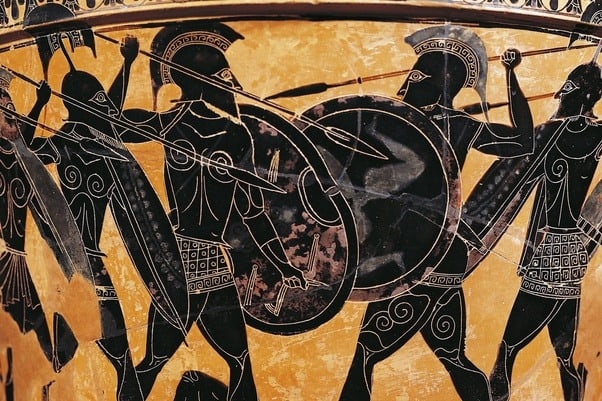
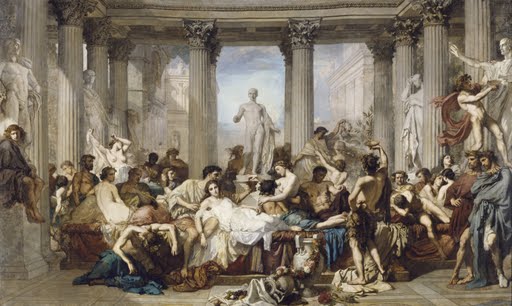
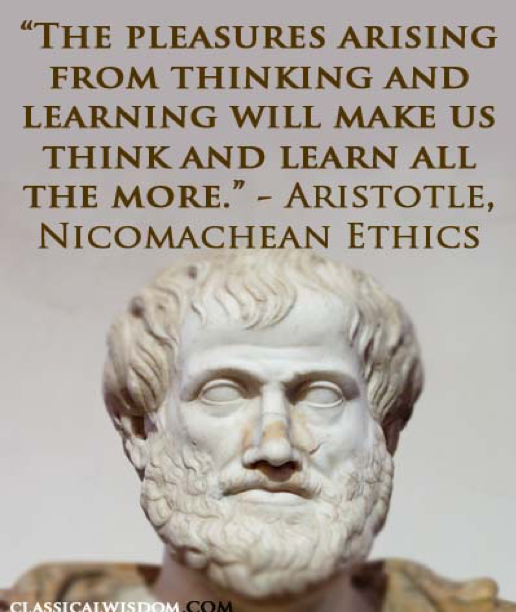
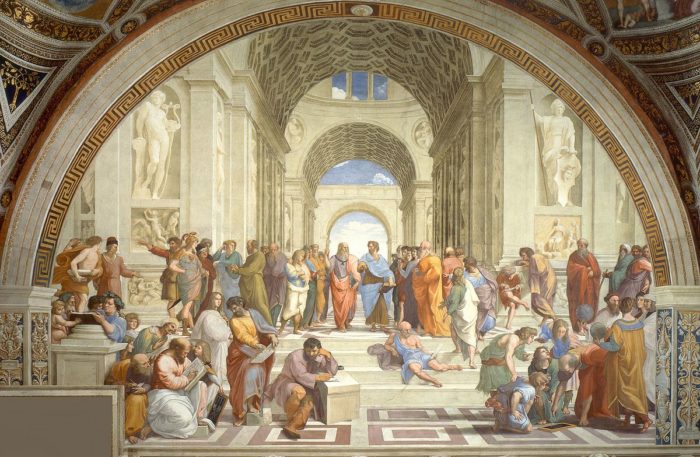
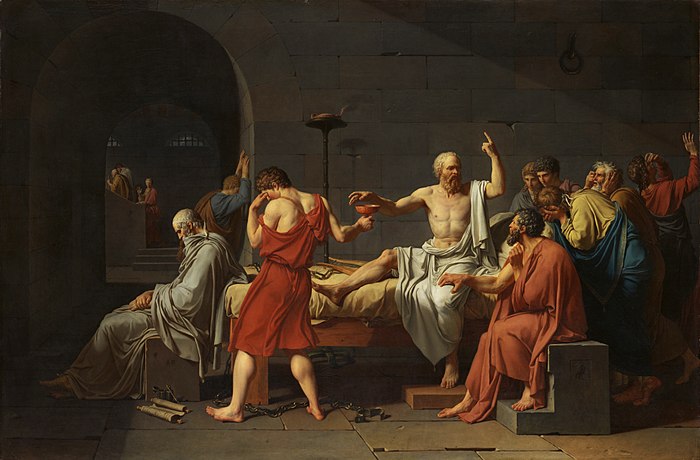








2 comments
As always, I find myself torn between the Stoics and the Hedonists. Strive for virtue, even though life is short? Admirable. Eat, drink and be merry? Why not, especially if we hurt no one in the process? Is there something of us that carries on after we depart this mortal coil? I see no sign of it.
The way I see it, taking pleasure in life is neither crime nor sin, if not done to excess or to the detriment of others. But doing right, simply because it is right, is a cardinal virtue. Fortunately, I see no necessary contradiction between them. I strive to do the right thing, as Epicurus would advise. And I try not to be bothered by things which are beyond my control, as the Stoics dictate. My ideal is a synthesis between Stoicism and Hedonism. I haven’t got it all figured out yet, and maybe I never will, but that’s my goal.
Thank you John G. for nominating my essay as one of the “best for 2019”!
(And to Isaac for your thoughts – above.)
Our apologies, you must be logged in to post a comment.